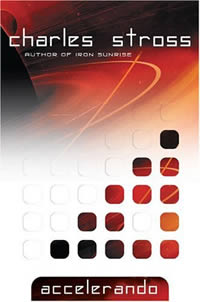Accelerando, by Stross
Friday November 8, 2019
Accelerando was referenced in Issue 169 of the Import AI newsletter. The Accelerando ebook is available for free, along with the author's charming story of how the book came to be. Accelerando is a reasonably fun, wacky romp through the technological singularity.
Bits of the story, such as the space lobster AI, have an absurdist element along the lines of Hitchhiker's Guide. A difference is that Accelerando has more connections to actual science and technology: different kinds of reminders of how strange reality can be.
The book was born in the late 90s, published as short stories, and finally released as a novel in 2005. Now, after the rise and (arguable) fall of Google Glass, among other things, it's interesting to consider how progress toward this imagining of the singularity is going.
The likes of DeepMind and OpenAI keep announcing new results, but the last 5% of the driverless car problem still seems hard. Language models are good enough to improve Google search, but don't really seem to be moving toward AGI. Some kind of progress is being made, but it isn't always clear how much any particular advance moves us toward specific long-term goals.
Is technology making people more productive? In the rich world, it sometimes feels like it might be doing the opposite, on average. Fiction loves a great personality, but I can't really see canonizing folks who are automating content farms, for example.
The book has dystopian elements, perhaps from the over-association of tech startup culture and singularity theorizing. Corporate structures become sentient. Legal battles and financial concerns still command a surprising amount of attention in the post-scarcity future of Accelerando.
Also typical of fiction, the book keeps you wondering what's going to happen. Somewhat atypically, the premise is that the world changes so much that humans can't understand it any more, so by definition the book can't deliver a satisfying conclusion, in some respects.
The characters have more sexuality than personality, but if you can ignore that and the transporter problem you get to upload your brain to a tiny light sail starship and watch a Dyson sphere get built. Could be worse.
